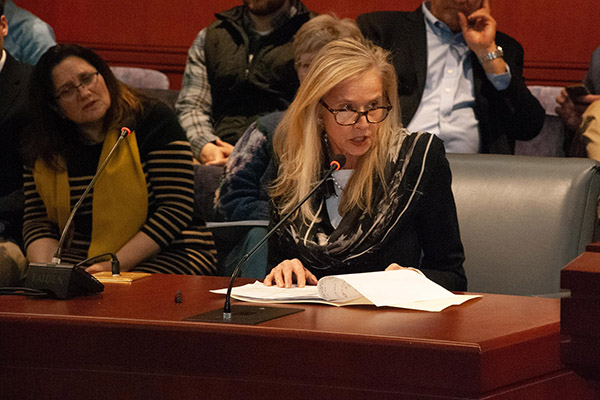Senator Hartley Testifies to Support Review of Environmental Justice Law

State Senator Joan Hartley testifies Monday in front of the Environment Committee in support of legislation that would refine environmental justice law.
HARTFORD, CT – This week, State Senator Joan Hartley (D-Waterbury) testified before the Environment Committee at public hearing in support of legislation aiming to evaluate, review and revise the state’s environmental justice law to better support municipalities and communities affected by it, including her own.
Sen. Hartley testified Monday afternoon that new language would require communities with five or more permitted waste facilities to enter environmental benefit agreements, negotiated between municipalities and developers, before any expansion or new facility siting. She, on behalf of the Waterbury delegation, asked the Committee to add a quantifiable metric to the Environment Justice statute, “recognizing there’s a point where a community can no longer absorb an expansion or additional facility and maintain a quality of life.”
Environment Committee Bill No. 5395 would require the state’s environmental justice law, which was enacted in 2008, to be expanded to consider the additional factors of asthma rates, effects on any water course, and air quality.
Sen. Hartley’s testimony referenced a recent situation in the 15th District. A portion of the city which is predominantly Hispanic and has a very unemployment rate, five schools, a multitude of churches and the highest asthma average in the state and is host to at least 10 permitted facilities. A recent proposal expanded a transfer station to allow a municipal solid waste facility which would accept 80 trucks per day on a six-day-per-week basis.
“Our question is, how much is enough,” said Sen. Hartley. “In a community, when does this stop? What is the saturation point? We’re asking that you consider adopting a metric that would simply say a certain number of permits in a particular area would represent a saturation point, beyond which the community cannot absorb anymore.”
Sen. Hartley proposed using Census blocks to identify specific areas. She noted her disappointment with the law’s current standing, as it puts more power in the hands of the municipality working with the developer than the community possibly impacted by the final development.
“What’s being asked is to simply establish a threshold, a number which says ‘beyond this, a community cannot absorb anymore.’ We’re talking about a simple number. We have over 12 permitted facilities in this particular Census track. The change can easily be done with no fiscal impact.”
Representative Geraldo Reyes Jr. (D-Waterbury), who sits on the Environment Committee, asked Sen. Hartley how the state can protect other towns from similar issues.
“This would establish a statewide high-water mark that says there is no ability to absorb additional permitted facilities and maintain a decent quality of life,” Sen. Hartley said.
Share this page:
